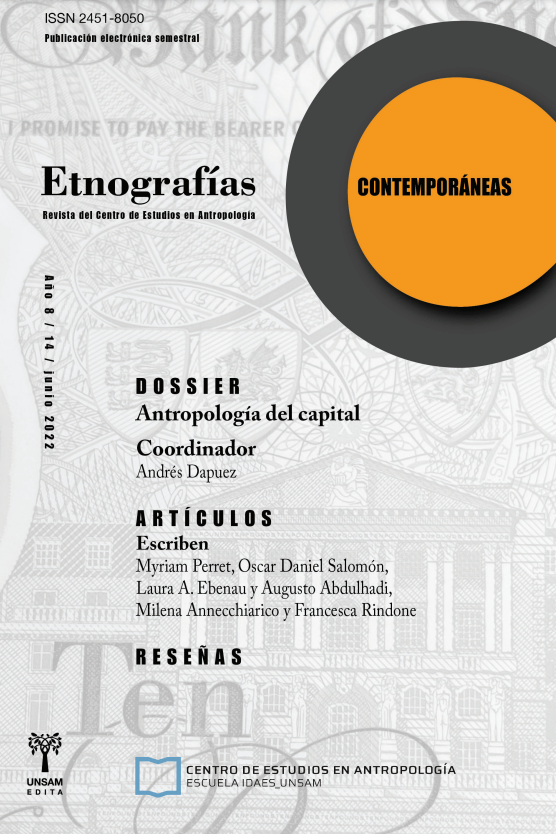Política proletaria hoy
Sobre los peligros y las posibilidades de la analogía histórica
Palabras clave:
analogía histórica, comparación, trabajo, proletariado, propiedad, dependencia, sur de África, Sudáfrica, antigua RomaResumen
Cuando las desposeídas clases urbanas contemporáneas son representadas como “proletariado”, se activa una poderosa analogía histórica por la cual la muy bien documentada experiencia de las florecientes clases trabajadoras industriales de la Europa del siglo XIX proporciona un patrón implícito de interpretación de eventos y procesos muy alejados, en tiempo y en espacio. El uso que Karl Marx ha dado a la figura del proletariado, frecuentemente proporciona inspiración y constituye un modelo para tales movimientos analógicos, ya en su propia época fue una analogía histórica compleja que invocaba las jerarquías sociales de la antigua Roma. Repensar esta historia intelectual doblemente analógica nos ofrece la ocasión tanto de considerar los usos y abusos de la analogía histórica, como para utilizar la reflexión sobre los proletarios originales (romanos) como palanca conceptual para desmontar algunos supuestos obsoletos sobre la política contemporánea de ciertas poblaciones urbanas sin propiedad, en el sur de África y más allá.
Citas
Alfoldy, Geza (1985). The Social History of Rome. London, Croon Helm.
Atkins, Margaret y Robin Osborne, eds. (2006). Poverty in the Roman World. New York, Cambridge University Press.
Bairoch, Paul (1988). Cities and Economic Development: From the Dawn of History to the Present. Chicago, University of Chicago Press.
Beard, Mary (2015). SPQR: A History of Ancient Rome. New York, Liveright Publishing.
Brown, Peter (2012). Through the Eye of the Needle: Wealth, the Fall of Rome, and the Making of Christianity in the West, 350–550 AD. Princeton, Princeton University Press.
Chatterjee, Partha (2006). The Politics of the Governed: Reflections on Popular Politics in Most of the World. New York, Columbia University Press.
Denning, Michael (2010). “Wageless Life”, New Left Review 66, pp. 79–97.
Fallers, L. A., (1961). “Are African Cultivators to Be Called “Peasants”?, Current Anthropology 2, 2, pp.108–10.
Ferguson, James (1999). Expectations of Modernity: Myths and Meanings of Urban Life on the Zambian Copperbelt. Berkeley, University of California Press.
–––(2015). Give a Man a Fish: Reflections on the New Politics of Distribution. Durham, North Carolina, Duke University Press.
Forment, Carlos A. (2015). “Emergent Forms of Plebeian Citizenship: Everyday Ethical Practices in Buenos Aires’s La Salada’s Market”, Current Anthropology 56 (supp. 11): pp S115–S125.
Gibson-Graham, J. K. (1996). The End of Capitalism (As We Knew It): A Feminist Critique of Political Economy. Oxford, Blackwell.
Gluckman, Max (1961). “Anthropological Problems Arising from the African Industrial Revolution. En A. Southall, ed., Social Change in Modern Africa.London, Oxford University Press.
–––( 1963). “Feudalism in Africa?”, Journal of African History, 4, 1, pp. 1–18.
Grant, Michael (1992). A Social History of Greece and Rome. New York, Charles Scribner’s Sons.
Hammond, John Lawrence y Barbara Bradby Hammond (1917). The Town Labourer, 1760–1832: The New Civilization. London, Longmans, Green.
Hammond, John Lawrence y Barbara Bradby Hammond (1920). The Village Labourer, 1760–1832: A Study in the Government of England before the Reform Bill. London, Longmans, Green.
Hannerz, Ulf. (1992). Cultural Complexity: Studies in the Social Organization of Meaning. New York, Columbia University Press.
Hardt, Michael and Antonio Negri (2000). Empire. Cambridge, Harvard University Press.
Hobsbawm, Eric (1965). Primitive Rebels: Studies in Archaic Forms of Social Movement in the 19th and 20th Centuries. New York, W. W. Norton.
Jacobs, Ricardo (2017). “An Urban Proletariat with Peasant Characteristics: Land Occupations and Livestock Raising in South Africa”. Journal of Peasant Studies. DOI: 10.1080/03066150.2017.1312354.
Knapp, Robert (2011). Invisible Romans. Cambridge, Harvard University Press.
Lefebvre, Henri (2003). The Urban Revolution. Minneapolis, University of Minnesota Press.
MacMullen, Ramsay (1974). Roman Social Relations, 50 B.C. to A.D. 284. New Haven, Yale University Press.
Marx, Karl (1978). The Eighteenth Brumaire of Louis Bonaparte. Peking, Foreign Languages Press.
Morley, Neville ( 2006.) The Poor in the City of Rome. In Margaret Atkins and Robin Osborne, eds. Poverty in the Roman World. New York, Cambridge University Press, 21–39.
Parkin, Tim G. and Arthur J. Pomeroy (2007). Roman Social History: A Sourcebook. New York, Routledge.
Ranger, T. O. (1985). The Invention of Tribalism in Zimbabwe. Gweru, Zimbabwe, Mambo Press.
Shelton, Jo-Ann (1988). As the Romans Did: A Source Book in Roman Social History. New York, Oxford University Press.
Sjoberg, Gideon (1965). The Preindustrial City: Past and Present. New York, Free Press.
Stallybrass, Peter (1990). “Marx and Heterogeneity: Thinking the Lumpenproletariat”. Representations 31,pp. 69–95.
Therborn, Göran (2012). “Class in the 21st Century”. New Left Review 78, pp. 5–29.
Veyne, Paul (1990). Bread and Circuses: Historical Sociology and Political Pluralism.New York, Viking.
Weber, Max (1969). “The Nature of the City”. En Richard Sennett, ed., Classic Essays on the Culture of Cities. Englewood Cliffs, N.J., Prentice Hall, 23–46.
Žižek, Slavoj (2012). Less than Nothing: Hegel and the Shadow of Dialectical Materialism.New York, Verso.
























